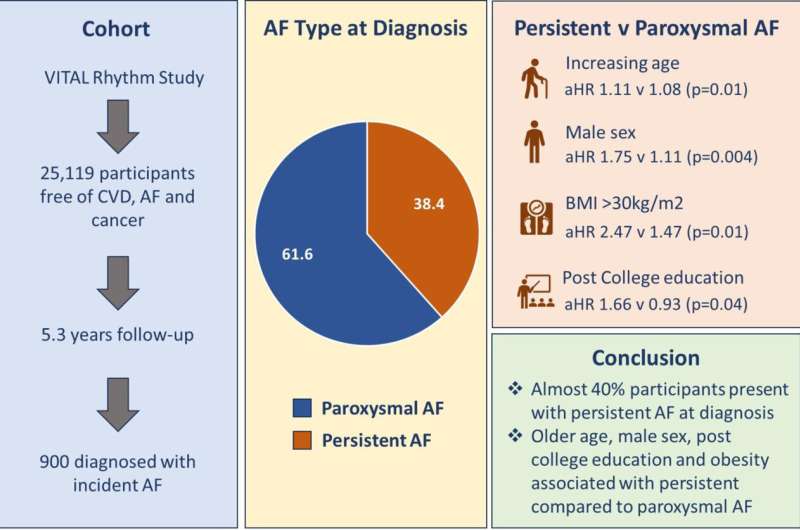This article has been reviewed according to Science X's editorial process and policies. Editors have highlighted the following attributes while ensuring the content's credibility:
fact-checked
trusted source
proofread
Patients diagnosed with new-onset, persistent AFib are more likely to have certain risk factors

Patients who present with persistent atrial fibrillation at diagnosis are more likely to have certain risk factors as compared with patients with occasional atrial fibrillation (AFib). The findings, led by investigators in the Smidt Heart Institute at Cedars-Sinai, published in Circulation: Arrhythmia and Electrophysiology.
Atrial fibrillation is an irregular heart rhythm that begins in the upper part of the heart. It is the most common type of arrhythmia.
"Once somebody has persistent AFib, our ability to put them back into a normal rhythm with ablation and medications is lower," said Christine Albert, MD, MPH, chair of the Department of Cardiology, the Lee and Harold Kapelovitz Distinguished Chair in Cardiology, and senior and corresponding author of the study. "In addition, several studies suggest that once you have persistent AFib, you may actually have a greater risk for stroke, heart failure, and dying from cardiovascular disease."
This more recent study found that risk factors for new-onset, persistent AFib include being older, male, overweight, having a higher BMI (≥30 kg/m2), and, interestingly, having post-college education.
Investigators theorized that the association between higher levels of education and persistent AFib may be related to people with greater health literacy being able to access health care services more easily. This correlation is presumed to make those with higher education more likely than people with less education to receive an ECG, which can detect asymptomatic, persistent episodes of AFib.
The findings were released as part of a sub-analysis of the VITamin D and OmegA-3 TriaL (VITAL), an ongoing study investigating whether daily dietary supplements of vitamin D3 or omega-3 fatty acids reduce the risk of developing cancer, heart disease, or stroke.
For this sub-analysis, investigators examined associations in lifestyle, clinical, and socioeconomic risk factors among more than 25,000 people without a history of cardiovascular disease, AFib, or cancer.
Over the course of 5.3 years, 900 participants developed AFib, and 346 (38.4%) had persistent AFib at the time of diagnosis.
"As cardiologists, we tend to think that we have some time, that we can intervene and prevent this particular type of atrial fibrillation," Albert said. "This data suggests a substantial percentage of patients present this way, so it's important to think about risk factor modification in the population that does not yet have known AFib but who are at risk for developing AFib in the future."
Albert said more trials are needed to learn how weight-loss interventions might prevent people from developing persistent AFib.
"This research shows which groups of people might be most at risk for developing persistent AFib," Albert said. "You could design a screening study targeted toward those populations to see if you could pick up atrial fibrillation sooner so that it can be treated."
More information: Melissa E. Middeldorp et al, Risk Factors for the Development of New-Onset Persistent Atrial Fibrillation: Subanalysis of the VITAL Study, Circulation: Arrhythmia and Electrophysiology (2023). DOI: 10.1161/CIRCEP.123.012334



















